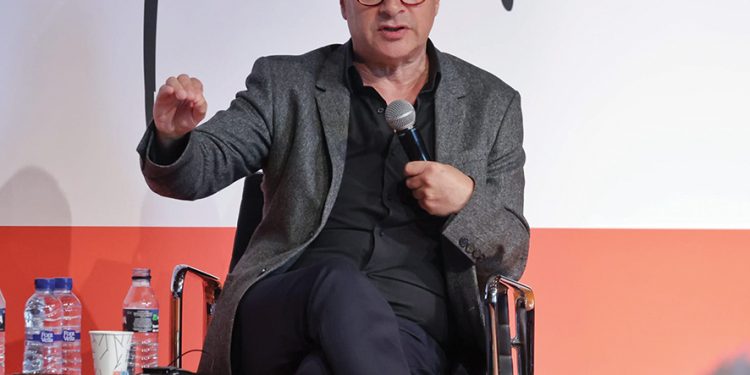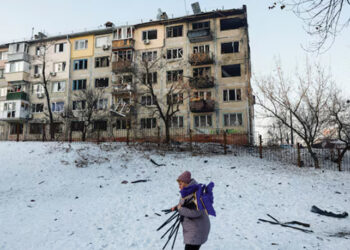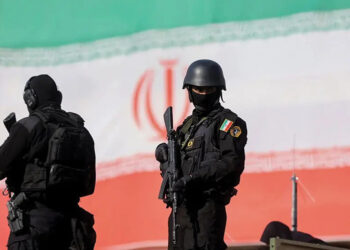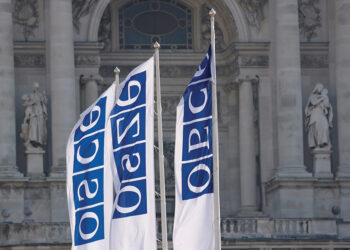In light of Prof. Orlando Figes latest book, “The History of Russia,” Radio Free Europe’s Georgian Service sat down with him to talk about Russia’s history and how much it informs its decisions today.
In the essay Vladimir Putin penned back in 2021, “On the Historical Unity of Russians and Ukrainians,” he claimed Ukraine was not a nation. Has he, against his wishes, made them into one for good?
Absolutely. Until 2014, Ukraine was a complicated and divided society, East-West, generationally in many ways. But since then, Ukraine has come together as a nation, proven in the way it’s fought to defend itself since February 2022. Putin made the very beast that he didn’t want to exist and denied could exist.
Many claim Putin seeks himself a place in the history books, and he often invokes the names of Peter the Great and so on. What do you think history has in store for him?
He doesn’t seem to have much longer the way things are going, but my guess would be he’s going to end up rather more like Nicolas I than Peter the Great. Peter the Great “took back” the Baltic lands into Russian sovereignty. Nicolas I went to war against Europe to defend what he saw as the greater Russia stretching to the Balkans, and indeed in a metaphysical sense to the holy lands, where he went to war to bully the Turks into giving the Orthodox the rights over the holy shrines. He underestimated the ability of the Turks to defend themselves, just as Putin has underestimated the ability of the Ukrainians to fight back. And he underestimated the unity of the Western powers to support even a Muslim power such as the Ottoman Empire against an aggressive state like the Russian Empire. Nicolas I first lost that war and died in miserable circumstances. He went down in late 19th century history as the worst tsar of all times. And to me, it looks increasingly like Putin might end up with something of the same.
Of the two possible scenarios, will Putin be dethroned from inside Russia, or through external influence?
It’s important to keep the Ukrainians armed and supported in every way possible, because the pressure of the war is most likely to bring down this Putin regime. My hope is that this summer counteroffensive will break through and create pockets of collapse on the Russian side, and the Russian troops will begin to see through the lies of what they’ve been told, why they’re fighting the Ukrainians. And maybe, just maybe, we will have a repeat of 1917, the exposure of the lie of WW1. It could turn things very quickly.
We may wish for the Putin regime to collapse under military pressure, with dissent, opposition street protests, but if there’s a military collapse, we could end up with a civil war or even the complete breakup of Russia, with a type of warlord emerging as a political military leader, a power struggle with arms, with parts of the mercenary army that have been mobilized and paid for by the state and oligarchs, and with a nuclear missile and tactical nuclear weapons armory possibly at the disposal of these people. With that in mind, I don’t think we want to defeat Russia for sure, we don’t want to push it into a catastrophe of civil war and chaos. There’s a balance to be had. I suspect it’s a discussion being had in NATO, in Washington and in all the Western capitals at the moment: how far one allows it to escalate, because it’s escalating quite fast. Just keeping the Ukrainians supplied with arms to fight and defend themselves, without necessarily going on a strong offensive that would escalate the war from the Russian side, was on the whole the best policy, because in this war Putin thinks time is on his side, meaning that he thinks that he will outlast the willingness of the West.
Does he have reason to believe that?
Yes. Even if this summer brings about some success for Ukraine, it’s going to take more than one counteroffensive to weaken and destabilize the military political system to the point where they start suing for peace or suffering an internal crisis. And we’ve got the American elections coming up – if Trump wins the elections? Or if other big geopolitical players like China weigh in on the Russian side? It’s going to be a long haul, unless there’s a more precipitous collapse this summer on the Russian military side than perhaps we had hoped for.
Putin may wonder if the West really cares about Ukraine as much as he and his cronies do. If not, will the next American president support another three, four years of arming the Ukrainians?
Ultimately, I think the biggest factor there is China, though. I don’t think China’s interests are served by letting Russia lose this war. Whether it is prepared to support it, and even cross the Rubicon to support it with direct military aid, I don’t know. But it’s fairly obvious that it’s not in China’s interest to let Russia lose.
What would Russia look like Post-Putin? It was also the subject of the conference in Brussels “The Day After.” Let’s take two scenarios: eventual Russian victory and eventual Russian defeat.
It depends what you mean by victory and defeat. If victory means Putin staying in power and annexing the four territories he’s declared Russian, and keeping Crimea, and getting some security deal over NATO expansion, then it’ll be more of the same, and he’ll be able to step down with all the laurels of victory and the status in the history books that he has written on his agenda. And then we’ll get Putin 2. And this is really unthinkable, and I don’t think any peace is even possible with Putin in power.
Russia in defeat, then? My worry is that if Russia is brought to its knees, and the economy allowed to suffer, we’ll have the real possibility of a new revanchist movement and anti-Western nationalism.
Whatever happens, in victory or defeat, it seems to me that Russia is going to be a lot weaker, and a lot poorer, for this war, and very much more isolated from Europe and the West in general. It will effectively become a sort of client state of of China, providing discounted fuel, raw materials, and minerals to the Chinese economy. That’s where its future will be, which is a great tragedy. But the Russians have brought it on themselves, I’m afraid.
Russians always seem to seek out a strong ruler, and this has been historically so. What does it tell us about their capacity to change?
It is a phenomenon of Russian mythology that the people want a Tsar, but it’s not necessarily in the Russian DNA, or in the cultural mix of what it is to be a Russian. Michail Bakunin, the 19th century Russian anarchist, wrote that for the Russians, the Tsar like a god, because he’s a projection of their utopian dreams. And there are many examples of Russian people following a tsar because they thought he was a sort of deliverer from injustice, from exploitation and enslavement. And, indeed, one might argue that the basic institution of Russian society until collectivization in the 1930s was the Russian Obshina, the Russian commune, which was basically a patriarchal village self government. But it did have, at its heart, some basic principles of the Russian people, which weren’t quite egalitarian, even socialist. And Marx’s theory is value derived from labor, not capital. That’s at the heart of the Russian peasant culture. So, I would say that this idea that the Russians needed or wanted a tsar is actually what they’ve been told for hundreds of years, and which they might have believed, because they’ve had no alternative, because they’ve had no tradition of parliamentary rule or republican governance.
I write in the book an example in 1917, Tsar Nicholas II had just been overthrown. One of the Mensheviks attends a socialist meeting of the soldiers, and they all say “Long live the Republic! Now, let’s elect a tsar!” And they want to elect him as a tsar. He leaves that with sense of “Oh, my God, what hope is there for the Russian people if as soon as they get their freedom, they want to elect a tsar?”
That mythology has to be bust. The Russians have to be presented with an alternative vision of statecraft, which involves them, which is politically accountable, which is elected, rules by law, which respects human rights. If they were given that, I don’t think they would object to it, it’s just that they haven’t had it.
How much has Putin borrowed from Stalin’s notebook?
An awful lot, but not necessarily in a direct way. The cult of Putin runs parallel to some degree to the cult of Stalin, in that he’s projected an image of himself as the strong man, the only man really capable of defending Russia against foreign hostile powers, and he’s not afraid to use Stalinist methods of terror and threat. When he talks about fifth columnists and enemies of the people, he doesn’t have to go to the lengths that Stalin went to kill people or send them to the Gulag, because the memory of that is still strong and has been passed down through the generations in Russia; all he needs to do is wave a stick and arrest 20,000 people at the beginning of the war to repress the street protests against it, and that’s enough for people to scurry away and be quiet in a way that leads many Western people, certainly a lot of Ukrainian people, to say they’re cowards. But the thing is, people remember what Stalin was like. And that is the power that Putin indirectly takes from Stalin. Stalin built a very effective police state, and it was a lot more efficient than Putin’s police state, which is inept, clumsy, brutal, and does things that are intimidatory and barbaric to its own people.
The fundamental thing about the Stalinist revolution, which remains at the heart of the Putin system, is the reversal of the notion of accountability. Political accountability is at the heart of democracy, that politicians are leaders and answer for their mistakes. Stalin managed to reverse that in a sophisticated way so that the people who answered for the mistakes of the bosses were the people underneath them. And it’s important to get that message across to the Russians, because that’s what’s happening now. And that’s what’s keeping people in line with Putin at the top of the system.
Interview by Vazha Tavberidze














